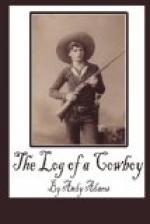“Well, in all my experience in trail work,” said Flood, as he gazed back at the dozen animals struggling in the quicksand, “I never saw as deceptive a bottom in any river. We used to fear the Cimarron and Platte, but the old South Canadian is the girl that can lay it over them both. Still, there ain’t any use crying over spilt milk, and we haven’t got men enough to hold two herds, so surround them, boys, and we’ll recross them if we leave twenty-four more in the river. Take them back a good quarter, fellows, and bring them up on a run, and I’ll take the lead when they strike the water; and give them no show to halt until they get across.”
As the little bunch of cattle had already grazed out nearly a quarter, we rounded them into a compact body and started for the river to recross them. The nearer we came to the river, the faster we went, till we struck the water. In several places where there were channels, we could neither force the cattle nor ride ourselves faster than a walk on account of the depth of the water, but when we struck the shallows, which were the really dangerous places, we forced the cattle with horse and quirt. Near the middle of the river, in shoal water, Rod Wheat was quirting up the cattle, when a big dun steer, trying to get out of his reach, sank in the quicksand, and Rod’s horse stumbled across the animal and was thrown. He floundered in attempting to rise, and his hind feet sank to the haunches. His ineffectual struggles caused him to sink farther to the flanks in the loblolly which the tramping of the cattle had caused, and there horse and steer lay, side by side, like two in a bed. Wheat loosened the cinches of the saddle on either side, and stripping the bridle off, brought up the rear, carrying saddle, bridle, and blankets on his back. The river was at least three hundred yards wide, and when we got to the farther bank, our horses were so exhausted that we dismounted and let them blow. A survey showed we had left a total of fifteen cattle and the horse in the quicksands. But we congratulated ourselves that we had bogged down only three head in recrossing. Getting these cattle out was a much harder task than the twenty head gave us the day before, for many of these were bogged more than a hundred yards from the bank. But no time was to be lost; the wagon was brought up in a hurry, fresh horses were caught, and we stripped for the fray. While McCann got dinner we got out the horse, even saving the cinches that were abandoned in freeing him of the saddle.
During the afternoon we were compelled to adopt a new mode of procedure, for with the limited amount of rope at hand, we could only use one rope for drawing the cattle out to solid footing, after they were freed from the quagmire. But we had four good mules to our chuck wagon, and instead of dragging the cattle ashore from the pommels of saddles, we tied one end of the rope to the hind axle and used the mules in snaking the cattle out. This worked splendidly,




